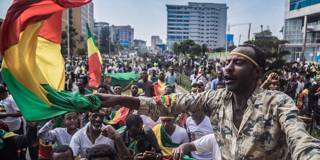Ethiopia’s Peace Prize Challenge
Ahead of next year’s election in Ethiopia – the country’s first since embarking on a transition to democracy in April 2018 – mistrust is rampant. To prevent sectarian forces from hijacking a historic opportunity, political leaders must urgently negotiate an agreement on the basic rules of the game for the post-election order.

ADDIS ABABA– As Ethiopian Prime Minister Abiy Ahmed collects this year’s Nobel Peace Prize in Oslo, his country is at a crossroads. In one direction lies a democratic transition, via a successful general election scheduled for May 2020. The other path would lead the country to instability, ethnic violence, and possibly a return to repressive authoritarianism.